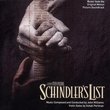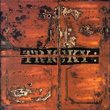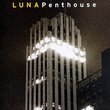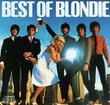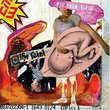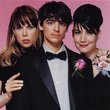| All Artists: Eileen Farrell Mack Harrell, New York Philharmonic, Dimitri Mitropoulos Title: Berg: Wozzeck/ Schoenberg: Erwartung/ Krenek: Elegy Members Wishing: 0 Total Copies: 0 Label: Sony Release Date: 10/14/1997 Album Type: Original recording remastered Genre: Classical Styles: Opera & Classical Vocal, Historical Periods, Modern, 20th, & 21st Century Number of Discs: 2 SwapaCD Credits: 2 UPC: 074646275924 |
Search - Eileen Farrell Mack Harrell, New York Philharmonic, Dimitri Mitropoulos :: Berg: Wozzeck/ Schoenberg: Erwartung/ Krenek: Elegy
 | Eileen Farrell Mack Harrell, New York Philharmonic, Dimitri Mitropoulos Berg: Wozzeck/ Schoenberg: Erwartung/ Krenek: Elegy Genre: Classical
In 1951, Wozzeck was an alien creature to both musicians and audiences. That explains some of the inaccuracies here, none of which amount to much alongside the inflamed conducting and singing found in this live recording o... more » |
CD DetailsSynopsis
Amazon.com In 1951, Wozzeck was an alien creature to both musicians and audiences. That explains some of the inaccuracies here, none of which amount to much alongside the inflamed conducting and singing found in this live recording of the New York premiere. Mack Harrell creates a moving portrait of the tortured madman, and Eileen Farrell's lavish dramatic soprano lends beauty to Marie's music even as it thrills on a purely vocal level. The supporting cast is fine, and Sony's remastering brings the mono sound to vivid life. But it's really Dimitri Mitropoulos' show; he leads a Wozzeck of white-hot intensity, inspiring all to outdo themselves. The fillers include Schoenberg's macabre one-acter, a gripping work starring Dorothy Dow, and Krenek's moving tribute to Webern. --Dan Davis Similarly Requested CDs
|
CD ReviewsMitropoulos and His Amazing Wozzeck! G P Padillo | Portland, ME United States | 10/28/2002 (5 out of 5 stars) "Even though everything I've read about this has been nothing short of "glowing" none of what I read was over-hyped. This simply is an amazing document of what had to have been one of the more spectacular evenings that have taken place in Carnegie.Farrell simply astonishes. From her very first scene I realized I'd never heard Marie sung like this before. In the lullaby, Berg sets such beautiful music to the words "Kein haber fresse sie, Kein wasser saufe sie" and Farrell's lush, rich, warm, motherly sound is exactly right. On the repeat of the next line, "Lauter kuhle Wein muss es sine!" she attacks the note on "lauter" (the G# below high C) with such deadly accuracy, it's simply thrilling, beautiful singing. Farrell is no master of sprechtstimme, she instead "speaks" those words with an actress's skill and when necessary, genuine venom.I know very little of the singing of Mack Harrell - but I don't think Wozzeck has had a more virile, masculinely beautiful performance. Harrell's Wozzeck doesn't sound so "apologetic" concerning his station in life as I think every other singer of this role has (at least to my ears). He looks at his "class" as a matter of fact. There is strength, here and a sort of nobility or pride, if you will, is almost always present in his sound. It makes his unhinging all the more wrenching and his violence against Marie absolutely gut-wrenching. Even in Act II scene iii, with Marie, his outburst didn't quite prepare me for his final undoing, which comes (as it should) not in the actual murder scene but in that following it. What Harrell does here just makes the blood run cold. A genuine mad scene. What has been said of the bottom of Harrell's voice is certainly true, the bottom notes are thin and he indeed has trouble sounding the lowest notes of the role, but this is indeed a small price to pay since so much of Wozzeck ain't "down there" anyway.Joseph Mordino comes from the school of genuinely over-the-top Captains, but his voice is magnificent. This guy's smoothness in music that is so wide-ranging and difficult it nearly defies description, deserves special merit.It is clear that Mitropoulos was in love with this score (so am I!) and his fluidity and attention to every detail and nuance, is remarkable. And he supposedly conducted this without a score to boot? Oy! The New York Philharmonic plays this music as if they'd known this score forever (it was their first outing with it), and the brass playing is especially lurid and thrilling. They are magnificent throughout, but the way Mitropoulos leads them in the final interlude is quite simply one of the most beautiful, disturbing musical nightmares ever committed to disc.At the beginning of the recording I thought the voices too forwardly placed and I was a bit disappointed that the orchestra didn't get the prominence I was hoping for, yet, only minutes into listening I'd forgotten that completely and found the balances to be just fine. The technicians did a good job of scrubbing up a live sound recording from 1951 and that good treatment carries all the way into the production of the cd package itself. At mid-price the notes (by Lord Harewood, which are okay), libretto and the vivid purple discs themselves (evidently re-recreations of the original lp's) all lend to the 50's ultra-mod "feel" of this masterpiece.A bonus on the 2nd disc of of the recording has a galvanizing performance of Schoenberg's "Ewartung" in a riveting and gorgeous reading by soprano Dorothy Dow. A great recording! ..." There's nothing like it Ted Zoldan | Los Angeles, CA, USA | 03/29/2005 (5 out of 5 stars) "Imagine: It is 1951. You are at the New York Philharmonic, sitting to hear an obscure opera by a German composer. You hear that it's "modern" and "weird"; and you settle yourself in for a boring night. Then it starts, and Dimitri Mitropoulos blows you away. Mitropoulos' reading of the score is, in a word, perfect. Just as Toscanini "owned" FALSTAFF, Mitropoulos owned WOZZECK. He makes sense of the loud, discordant notes Berg has provided, and makes them beautiful. The New York Philharmonic is not an Opera Orchestra, and they may not be as apt as playing an operatic score, especially such a weird one, as The Met or the Weiner Staatsoperorchester might be. But Mitropoulos overcomes any problems with the musician's playing. Chorus work, minimal in this opera, is also excellent. The Singers pose an interesting paradox. None of them are native German Speakers, and individual elements of the cast can be and have been bettered. Yet these singers fit their difficult roles to a T and are irreproachable for their handling of the complicated Sprechtimme. The pick of the litter is Mack Harrell's Wozzeck. He is probably the best on records: a powerful voice used to great effect, despite some weak low notes. Then again, as other reviewers have pointed out, Wozzeck isn't really all that low a part. His Sprechtimme pasaages are enthralling, and dramatically he is irreproachable. In the last act, infact, he is actually frightening. His death scene is heartstopping in it's intensity. Eileen Farrell is a beautiful Marie. From a purly vocal standpoint, she sings better than anyone on record. She is, perhaps, not as strong dramatically as her competators, but she has enough skill to convey Marie's coyness, anger and anguish without melodrama. Joseph Mordino is an interesting case. As the Captain, his German has a stronger American accent than the other singers, and he is often off-pitch. Sometimes you wonder if he is even attempting to sing the notes, despite the occaisional moment of beauty. But the Captain's role is mainly Sprechtimme, and from a dramatic standpoint, he captures the raving, near hysterical insanity of the officer. He also sings the small role of The Fool and takes the one line appearance of a soldier in Act Two scene 5 to good effect. Ralph Herbert doesn't have the deep, black bass I like to here as the Doctor, but his bass-baritone is far from weak and he's quite strong when convaying the clinical madness and spider-like evil of the Scientist. Next to Harrell and Farrell, David Lloyd has the most beautiful voice in the cast, a lyric sound used to good effect in the stick-gathering episode and the Tavern Garden. Frederick Jagel doesn't exactly vocalize beautifully (a quaver here and there with an unpleasant scratchy quality to the voice) but it fits the preening brutality of the Drum Major. Edwina Eustis is a rather screechy Margret, and the two workmen (Adolph Anderson and Hubert Norville)are also strong. The performance is paired with studio recordings of a nicely played SYMPHONIC ELEGY FOR STRING ORCHESTRA (by Krenk) and Schoenberg's half-hour monodrama ERWARTUNG. Both feature Mitropoulos and the New York Phil, who sound more bombastic and less pleasant than they do for the Berg Work. The Soprano in ERWARTUNG is Dorothy Dow. She has a strong, beautiful voice and is apt enough dramatically. She is sometimes overpowered by the orchestra. This is opera as drama, opera as theatre. Highly recomended." El mejor Wozzeck Jose Carmona Santiago | Aguadulce, Almerķa Spain | 06/07/2000 (5 out of 5 stars) "En estos dos CDs tenemos tres primeras grabaciones de tres obras complejas. Con respecto a la de Krenek he de decir que al no tener otra grabación con la que comparar simplemente cabe apuntar que es de una belleza enorme. El Erwartung de Schoenberg en manos de Mitropoulos es profundamente expresionista, pero con un romanticismo oculto que le va muy bien a la obra. La soprano está bien, pero es muy preferible Jessie Norman en la grabación de Levine. En todo caso, el plato fuerte es el legendario Wozzeck. En primer lugar, apuntaremos los contras. Era la primera vez que orquesta y solitas interpretaban la obra, así que hay algunos fallos de ejecución por parte de los instrumentistas y algunas notas falsas dadas por los cantantes. Sin embargo, esto no afecta en nada a mi opinión de que esta (junto con la de Kegel) es la mejor versión posible de esta asombrosa obra. Parece mentira que estemos en un concierto, pues el ambiente es absolutamente teatral. Mitropoulos dirige con control férreo, con mano de hierro en guante de seda y da a cada nota su exacto valor tanto musical como teatral. Es el único director en disco que utiliza y comprende hasta el último extremo lo que quería expresar Berg cuando compuso su ópera en base a formas conocidas (suite, sinfonía, lied, ...). La tensión se mantiene hasta el final, y es hacia el último cambio de escena, hacia ese impresionante resumen musical después de las muertes de Wozzeck y Marie hacia donde Mitropoulos conduce toda la fuerza de la obra para dejar paso a una última escena escalofriante. Los cantantes están increíbles, a pesar de las dichas notas incorrectas. Un Wozzeck y una Marie que son víctimas insconcientes de los títeres macabros que son el Doctor, el Capitán, el Tambor Mayor y, en cierta forma, el resto de personajes. Para terminar, la mejor versión de Wozzeck (junto con la también impresionante de Kegel, llena de verdad) gracias, sobre todo, a la labor de ese gigante de la dirección orquestal que fue Mitropoulos."
|

 Track Listings (10) - Disc #1
Track Listings (10) - Disc #1
